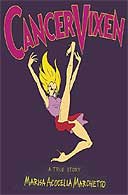
Cancer Vixen: A True Story
by Marisa Acocella Marchetto
192pp, Fourth Estate, £12.99
Is it a self-obsessed fashionista, flying through the air in search of a new pair of Jimmy Choos? Is it a size zero New Yorker, groomed to within an inch of her lollipop head and disappearing when she turns sideways? Is it another poor-me memoir blaming family or society or anyone but the author for their current state of singledom/drug addiction/alcoholism/unhappiness? No. It's Cancer Vixen, Marisa Acocella Marchetto's funny, dark, graphic memoir of her diagnosis and treatment for breast cancer.
I found this memoir enormously funny and perceptive, with the bonus of being lovely to look at as well. Admittedly, I already knew the basics of the story and made many of the same gags in my own show about my near-identical experience of the same disease, but then I think a good death joke is funny, whether you've been sick or not - and we're all going there one day. Acocella Marchetto doesn't flinch from the nastiness, the fear or the occasional bitterness of the experience. She draws an honest sadness, but she does so with humour and self-deprecation, the polar opposite of those ghastly tabloid "my brave battle" cancer stories. Her account of illness through diagnosis, surgery, chemotherapy and radiotherapy, in the process getting married to the man it took her 40-odd years of single life to find, is as inspiring as these memoirs usually aim to be, but far funnier than most. And given that all of us will at some point in our lives have a parent, friend, partner, child or sibling with such an illness, this book, though primarily concerned with breast cancer, ought to touch much of that wider audience too. Certainly Acocella Marchetto gives a good deal of weight to the supporting cast. The mother accompanying her daughter to chemo treatments who can't help commenting that the steroids are making her pile on the pounds. The (many) friends who offer great help, and the (fewer but often louder) friends who ask "how did you get cancer, do you think?" - which is no help at all. The women who hit on her brand-new husband (a man successful with the ladies in the way only an Italian, monied, heterosexual male can be in Manhattan), offering themselves when he's "ready for a healthy relationship". If Acocella Marchetto is good on the funny stuff, the goriness of injections and blood tests, the gruesome side effects of therapies, she is possibly even better on the bittersweet - saying farewell to the never-born children that disease and treatment take from her future.
There is an obligatory "what I learned from being sick" section at the end, but it's not overly saccharine, and given the author's mocking self-awareness in other parts of the book, it feels entirely genuine. While complementary therapies are perhaps a little too peremptorily dismissed, there is a great deal of useful practical information about the basics of the traditional medical treatments, along with both positive and negative outcomes. So yes, do get it for your newly diagnosed loved one - especially if she's a younger woman with breast cancer, since there's still not that much out there for younger women with the disease - but maybe don't get it in the first week or so. Acocella Marchetto's neatly drawn Death cuts a fine figure, and we'll all come to understand mortality eventually, but I suspect a fully developed sense of dark humour takes a period of adjustment before it reaches the maximum death-mocking glory displayed here. It also - usually - takes staying alive. Which is why this is probably a more enjoyable read for those of us fortunate enough to still be here, than for the people left behind by those who aren't.
If the cancer humour can be harshly hilarious, possibly the most stark discussion in the book concerns money. Acocella Marchetto is a freelance cartoonist. Like all freelancers, if she doesn't work, she doesn't get paid. No sick pay for the self-employed. Further, her work involves constantly developing new ideas, and offering them up to buyers on magazines and newspapers. She states that the rejection rate for a cartoonist in New York is 97% - and that's just for the work the artist deems good enough to offer for sale. In order to have an income, and to ensure her career would continue post-cancer, she had to keep working - as do very many people during treatment for all sorts of severe illnesses, disease not often conforming to the televisual myth, where the world invariably stops with the first chemo-induced hair-fall. In this case, though, Acocella Marchetto's health insurance had run out before she was diagnosed. She paid for the initial tranche of scans, blood tests and biopsies with cheques and credit cards. She saw exactly how much her disease was going to cost. When she married, between surgery and chemotherapy, her husband's insurance was able to take her on too - as she says, they were lucky.
Over the next year, she added up the cost. In 2004, the price of breast cancer diagnosis and treatment to Acocella Marchetto, aged 43 - a sum she would have had to find herself had her husband's insurance not stepped in - amounted to $192,720.04. In 2000, the cost of the same treatment to me, aged 36, in London - with no health insurance - was £0.00. I love New York, and Acocella Marchetto reminded me how very much I enjoy Manhattan, but I know where I'd rather be sick.
· Stella Duffy's latest novel, Singling Out the Couples, is published by Virago

